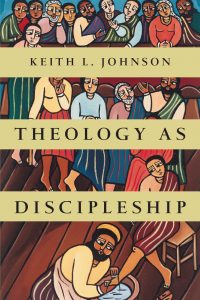 In the sixth chapter Johnson argues that the “mind of Christ” and the pattern of Christ’s humble obedience go together. On this basis, then, a Spirit-filled life of humble, self-sacrificial love is a defining mark of a theologian who shares the mind of Christ. The theologian pursues knowledge rightly when they do so for the sake of others, out of a desire to serve them by pointing them to God and sharing his love with them (148). Johnson’s emphasis is on the pursuit of theological knowledge, for our finitude and fallenness mean that we cannot, in and of ourselves, gain the knowledge of God. Rather, this knowledge comes to us only as a gift of grace. Thus the theologian “must proceed under the assumption that we are not free to determine how our discipline operates. Our knowledge of God does not result from an act of our will, as if we can know God simply because we want to do so” (151).
In the sixth chapter Johnson argues that the “mind of Christ” and the pattern of Christ’s humble obedience go together. On this basis, then, a Spirit-filled life of humble, self-sacrificial love is a defining mark of a theologian who shares the mind of Christ. The theologian pursues knowledge rightly when they do so for the sake of others, out of a desire to serve them by pointing them to God and sharing his love with them (148). Johnson’s emphasis is on the pursuit of theological knowledge, for our finitude and fallenness mean that we cannot, in and of ourselves, gain the knowledge of God. Rather, this knowledge comes to us only as a gift of grace. Thus the theologian “must proceed under the assumption that we are not free to determine how our discipline operates. Our knowledge of God does not result from an act of our will, as if we can know God simply because we want to do so” (151).
In a certain sense the act of seeking is itself the goal of our work, because this act produces the exact kind of intellectual and moral formation God desires us to have. Put differently: the practice of theology should be ordered around the goal of seeking God rather than finding him precisely because the act of seeking is what forms us to adopt the humble way of life that corresponds to the mind of Christ (152).
Theology, then, is as much a matter of prayer—of communication with God—as it is about gaining new insights and information. That is, “we are theologians who live on our knees before God, with an open Bible in front of us and the voice of the church in our ears” (155). Johnson unpacks this picture of faithful theological work in his final chapter in which he sets forth nine practices of those who practice theology as disciples:
- They measure their thinking and speaking about God by the person and work of Christ as revealed in Scripture.
- Their thinking stays within the limits of faith in Jesus Christ; that is, they resist reductionist attempts to remove all mystery, erase all doubt, or answer every doctrinal question in an all-encompassing system.
- They endeavour to live obediently in the pattern of the incarnate Christ’s obedience to God.
- They engage in their theological work for the benefit of others.
- They use their theological work to serve the church and its mission.
- They pursue both truth and unity.
- They practice their discipline with confidence while avoiding defensiveness.
- They utilise the insights of the non-theological disciplines to enrich their own thought.
- Finally, they pursue their work with joy, for their work is an act of worship that anticipates the worship they will offer to God into eternity.
